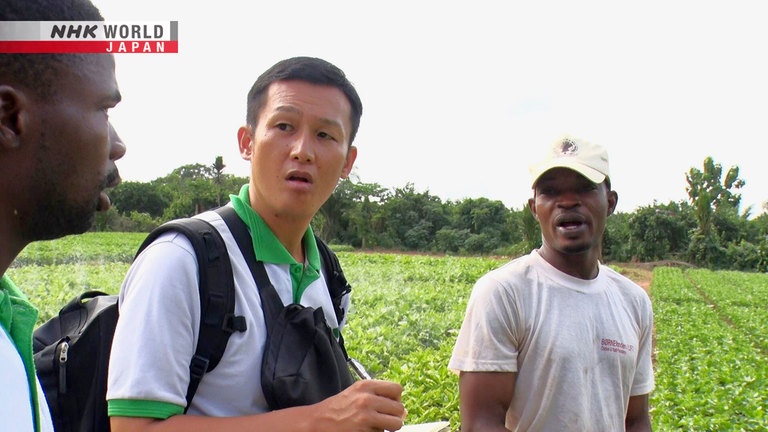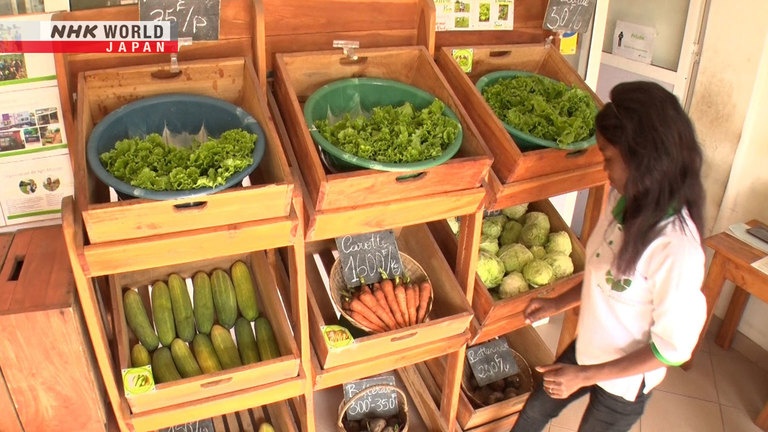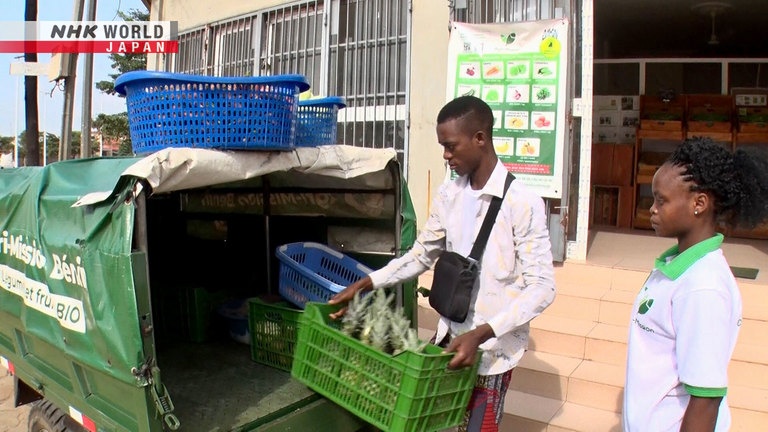Building a Market for Organic Farmer: Benin
In Benin, a Japanese entrepreneur and his local partner are helping logistically isolated rural organic farmers connect with savvy urban customers who can pay good prices.




Transcript
Cotonou is the Republic of Benin's largest city.
The central Dantokpa market has over fifteen thousand stores selling everything from household items to food.
It's thought to be West Africa's largest market.
This is the vegetable section.
From local produce to imports from neighboring countries, there's plenty on offer here.
This organic produce store, meanwhile, is on the outskirts of Cotonou.
Organic stores are a rarity in Benin.
All of the products here are grown domestically.
Market stalls mix bad and good
produce. This place is safe.
I want to buy vegetables grown
naturally, not with chemicals.
Customers can also use an app to have produce delivered.
For locals, this is a novel type of service.
Deliveries are convenient.
You don't have to scour the markets.
The service was launched by a startup founded by two partners: one Japanese and one Beninese.
Watanuki Daichi first came to Benin as an agricultural support volunteer, before teaming up with former farmer Romain Dakpo in 2021.
They sell organic produce grown in rural Benin.
These items are new to the city, as there was previously no distribution route.
Young rural farmers are growing high-value organic produce to boost their incomes.
But rural markets don't value organic food, and many farmers face financial hardship.
At the market, buyers don't
recognize the value of organic.
They complain that it's pricier
than regular vegetables.
Watanuki and Dakpo's firm supports rural farmers by buying organic produce at a fair price.
Benin has many young, motivated,
and hard-working farmers.
But they don't have a market to
sell what they grow.
Some even end up having to
discard their produce.
Urban consumers want organic produce.
So we are connecting them.
Meet the partners working to help young farmers and spread prosperity through organic farming.
Benin's biggest city, Cotonou.
Considered the country's de facto capital, this economic hub is home to around 700,000 people.
The startup's store and office are on the city's outskirts.
The Cotonou team consists of Watanuki and three Beninese locals who handle sales and deliveries.
They carry a range of organic produce, all grown in Benin by around 250 contracted farmers.
Although prices are higher than at the market, the store has a reputation for quality.
This is a map of Benin.
It shows where the produce
comes from.
And photos of the people who grew it.
That visibility is important.
The team begins loading a motorcycle truck.
Most of the startup's sales come from deliveries, rather than the store.
They have around 150 clients, primarily restaurants and wealthy consumers.
Today, Watanuki is helping with the deliveries.
I visit our big restaurant clients
and new private customers.
It's important to meet face-to-face.
This kind of vegetable delivery service is uncommon in Benin.
Their first stop is a restaurant in central Cotonou.
They've been a supporter of the firm since it was founded.
The owner and chef trained in France and built a career in restaurants across Europe.
He sees great value in organic produce for its natural flavors.
It's hard to find good vegetables
from a big crowd of them.
I met him in the market. His
courage and energy shone through.
His work is important. It provides
good food to my customers.
Their next delivery is to a popular restaurant in central Cotonou - another long-running relationship.
Watanuki was the one who told them about the excellent organic produce being grown in rural Benin.
Do you have any requests?
A wider choice of fruit.
Pineapples, avocados, oranges.
The fruit from the market
rots in a matter of days.
It's the strange chemicals they use.
I'd like organic fruit.
Their next stop is a private customer.
This woman runs a successful boutique.
For the last few years I've
only eaten organic produce.
I can't speak to the difference in taste.
But I believe in traceability.
It's good for me, and I only give my kids
organic vegetables and juice.
The clients are clearly dedicated to buying organic produce.
So why is it so hard to get rurally grown vegetables in Cotonou?
Benin has no major brokers
connecting rural and urban areas.
It's a logistical issue.
The network just doesn't exist.
A rural farmer doesn't have the
connections to sell in the city.
There's a disconnect between
the city and the countryside.
Despite the strong dedication of rural farmers, their organic produce was rarely reaching Cotonou.
The startup came up with a new system to make it easier.
Customers can now use a smartphone app to order the vegetables they want, paying for their purchases digitally.
The startup receives the orders and forwards them on to the rural farmers.
An order goes to one of the 250 contracted farmers - Alain Tossou from a town called Cove, 150 kilometers north of Cotonou.
He harvests the cucumbers that very evening.
Before the startup, Tossou struggled, because local markets didn't recognize the value of organic produce.
The extra cost and hard work weren't rewarded.
Produce using chemicals is cheaper
so local markets buy it.
We have to sell organic food
at lower prices around here.
The firm buys produce at a 20% mark-up over the local markets.
And while local markets only pay in installments, digital payments are made immediately and in full.
This allows farmers to plant their next batch right away.
The same evening, Tossou brings the harvested vegetables to the home of a driver who has a contract with the company.
He runs a communal taxi service all the way to distant Cotonou.
The freshly harvested vegetables are handed to the driver and loaded into the taxi's trunk.
At 6AM, the taxi heads to Cotonou, carrying produce from several farmers.
Naturally, he also takes regular passengers.
Using shared taxis like this has allowed for major savings on transport costs for the firm.
The freshly harvested organic vegetables head out to Cotonou through the morning mist.
They arrive at the store that morning, before being delivered to customers.
However, the firm is careful not to buy all of the crops grown by their contracted farmers.
Our core goal is to increase
the number of independent farmers.
An independent farmer is one
with a lot of different buyers.
We want them to work out how they
can maximize their profits.
We should be just one of the
potential buyers they can choose.
So we don't buy everything they grow.
Only what we need to fulfill orders.
This approach also helps each party avoid becoming entirely dependent on one another.
The farmers must grow good quality produce to entice buyers.
Watanuki's firm will lose client farmers if they don't offer good terms.
He believes these economic incentives are the best way to produce a win-win situation for everyone.
Today, Watanuki is heading to Cove, where the firm has a lot of contracted farmers.
A three-hour drive north of Cotonou, it's a rural area with a population of around 50,000.
Watanuki is visiting his co-founder and vice-president Romain Dakpo.
He largely works out of his home in Cove.
He is in charge of managing
relationships with farmers.
Dakpo was once a farmer himself.
The partners met when Watanuki came to support Beninese agriculture as a volunteer from Japan.
Watanuki's first experience volunteering was as a college student when he supported farmers in Zambia.
He felt disappointed that although he wanted to work on an equal footing with local residents,
hierarchical structures always seemed to come into play.
He later focused on development studies at a UK graduate school.
He worked at a major Japanese firm with a history of international aid,
but decided that the only way to truly support locals on equal terms was to start a business himself, taking on the risks involved.
He joined a Japanese governmental volunteer program at age 35 to prepare for launching his business.
He was sent to Cove in Benin, where he helped farmers get a handle on their operations.
That's where he met Dakpo, the leader of a group of young, organic-focused farmers.
I was astonished at how hard he worked.
Always thinking of others.
He listened, he was punctual.
And he always did what he promised.
We thought the only way foreigners
would help was to hand out money.
But Watanuki taught us
useful things like marketing.
He didn't look down on us as Africans.
He taught us as equals.
The two hit it off and they began working with farmers to improve livelihoods.
One strategy was to sell organic produce in the city where customers pay higher prices for it.
After Watanuki finished his volunteer program, they launched their business together in 2021.
Whenever Watanuki visits, Dakpo takes him around the farms on his bike.
Their first stop is just outside Cove - a farmer with whom they hope to sign a contract.
We heard you grow organic vegetables.
Many people love them.
We tasted them and they're great.
We'd like to contract with you.
They begin by discussing fertilizer and pest control.
The farmer fertilizes with cow urine.
They make organic insecticide by mixing neem oil and natural soap.
Next, they visit the fields where he grows cabbage, peppers, and carrots.
I make compost with manure.
What do you use?
Chicken manure, with
some cow and rabbit manure.
I also add vegetable scraps.
The field is laid out neatly, and clearly well cared for.
But the farmer faces the same issues as other organic farmers in the area.
The market buyers don't
value organic produce.
They pay the same as for
crops grown with chemicals.
That's no good.
Even though your costs are higher?
That's right, yes.
They sign a contract with the farmer - a new partner.
He's exceptionally skilled.
I look forward to working with him.
I hope we can sell his produce
at a good price for him.
Their next visit is a farmer with whom they recently partnered.
The farm began planting cabbages and cucumbers, after learning that they sell for high prices.
The main issue they face is that there isn't enough water to cover the expansive fields.
You need a well.
You could dig a well in a
morning with the right machinery.
I dug one for my fields.
There was water at 30-40m.
Do you have requests for us?
I want to sell our cucumbers.
We have space to grow more
carrots and cabbages too.
- We already bought some, right?
- Cabbage and cucumbers, yes.
- A lot?
- Some.
He'd like us to buy more,
and consistently.
Watanuki understands why farmers want them to buy more, but he has concerns.
He needs to stick to the startup's principles.
It's not about just buying
whatever they grow.
They need to learn
how to maximize their profits.
I'd like to see them
strategizing as a business.
The firm is now in its third year and several contracted farmers have taken these ideas to heart.
One of them is Cove farmer Gilbert Ahouninnou.
He's been working with the startup since its founding, over which time his approach has changed dramatically.
I couldn't grow much variety before
I started working with them.
I was only growing lettuce.
I'd grown other vegetables, but
I couldn't sell them all at the market.
Now, he grows a wide range of produce, including chilis, cucumbers, and tomatoes.
He plans his crops with an eye on market demand.
This ensures his produce fetches a high price.
Before, I just grew what I could.
Then I'd try to find buyers.
I discarded a lot of leftover produce.
I often lost money.
But Agri-Mission showed me how
to find buyers before planting.
They don't buy everything I grow.
But I have learned to find buyers
before I grow anything.
Now that the farm is doing well, Ahouninnou is expanding his fish farm, which was previously a back-up business.
Watanuki and Dakpo are hoping to increase the number of such farmers, eager to shape their own strategies for success.
Back in Cotonou, Watanuki has a new strategy to expand the business.
His employees are making smoothies from organic produce.
The mixer crushes frozen pineapple, carrots, beets, baobab, and other vegetable juices.
Processing unsold produce instead of throwing it out could help increase the firm's profit margins.
They're also trying another new strategy: streetside marketing.
Through the smoothies, we get potential
customers to take an interest.
Then we explain that we also sell
organic vegetables.
The vegetable delivery service isn't seeing much growth among private customers.
Door-to-door sales are often turned away.
They hope that selling smoothies will be good marketing for organic produce.
The streetside marketing will take place in central Cotonou, not far from an international school.
Organic produce is mainly bought by wealthy families, many of whom live in this area.
They greet a passing student.
It's made from natural fruit
and vegetables. From US$1.70.
They sell a bottle. A good start!
We sold one!
Paying $1.70 just like that...
This is a wealthy area.
Another customer.
They sell two more bottles!
Take a flyer.
We sell fruit and vegetables.
We can deliver as well.
The sales continue.
It's good. Really good!
Where is your store?
Here's our flyer. We're in
Abomey-Calavi and we deliver.
Check out our social media accounts.
We sell organic produce grown
in Benin.
Please drop by!
- We can see it ourselves?
- Yes. And we deliver.
We'll start buying regularly.
Watanuki's plan to attract wealthy private customers through smoothies looks to be a success.
It will take more strategies like this one to grow sales and ensure the business stays sustainable.
These efforts will help the farmers as well as the company.
We started the firm
to support local farmers.
I hope to hold workshops
and such to help them grow.
Our firm will grow
right alongside them.
Eventually I would love to see it
help all of Benin develop.
Young Beninese farmers are building a better future through organic vegetables.
Partners Watanuki and Dakpo have embarked on a venture to support them,
in the hope of creating shared wealth through agriculture in Benin.